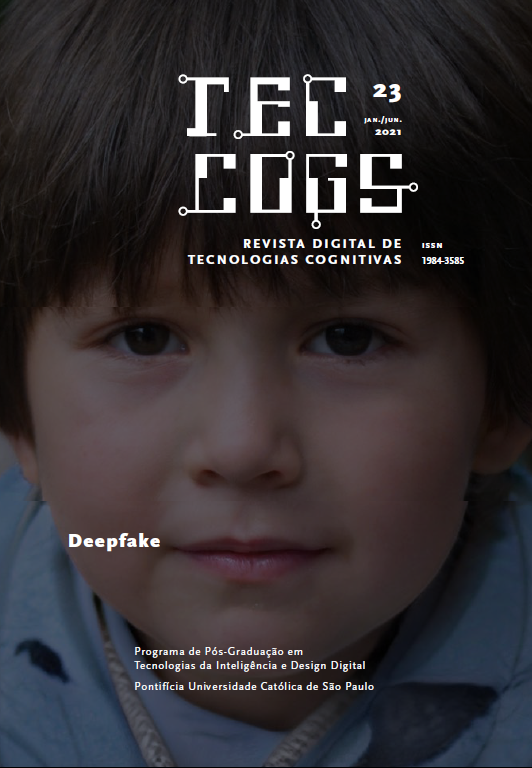Book review
"Ethics of artificial intelligence", by Matthew Liao
DOI:
https://doi.org/10.23925/1984-3585.2021i23p157-163Abstract
The British company DeepMind Technologies, founded in 2010 and acquired by Google in 2014, is a reference in the field of Artificial Intelligence (AI); in 2016, its AlphaGo program not only beat the world champion of the millennial Chinese game Go, South Korea's Lee Sedol, but did so with unprecedented moves. The feat resonated with the AI community, spurring China's recognition of the technology's strategic role. In the same year, not by coincidence, the Center for Mind, Brain, and Consciousness at NYU, under the coordination of philosophers David Chalmers and Ned Block, gathered about thirty speakers, among technology and humanities researchers, in the conference "AI Ethics".
In an effort to identify how to introduce ethical principles and human values into intelligent systems, the panels addressed concepts such as machine morality and ethics, artificial morality, and friendly AI. Throughout the conference, however, a consensus was established that ethics belongs to the human sphere, that is, it permeates the choices of developers and users. It fell to Swedish philosopher Nick Bostrom, author of the book "Superintelligence" (2014), to open the event by warning about the benefits and risks of the realization of the "intelligent machine" in the 21st century. In addition to Bostrom, the conference featured talks by Peter Asaro, John Basl, Meia Chita-Tegmark, Kate Devlin, Vasant Dhar, Virginia Dignum, Mara Garza, Daniel Kahneman, Adam Kolber, Yann Le-Cun, Gary Marcus, Steve Petersen, Francesca Rossi, Stuart Russell, Ronald Sandler, Jürgen Schmidhuber, Susan Schneider, Eric Schwitzgebel, Frans Svensson, Jaan Tallinn, Max Tegmark, Wendell Wallach, Stephen Wolfram, and Eliezer Yudkowsky.
References
BOSTROM, Nick; YUDKOWSKY, Eliezer. The Ethics of Artificial Intelligence. In: FRANKISH, Keith; RAMSEY, William (eds.). The Cambridge Handbook of Artificial Intelligence. New York, NY: Cambridge University Press, 2014. Disponível em: cambridge.org/core/books/cambridge-handbook-of-artificial-intelligence/ethics-of-artificial-intelligenceB46D2A9DF7CF3A9D92601D9A8ADA58A8. Acesso em: 12 maio 2021.
COECKELBERGH, Mark. Artificial Intelligence, Responsibility Attribution, and a Relational Justification of Explainability. Science and Engineering Ethics, 2019. Disponível em: link.springer.com/article/10.1007/s11948-019-00146-8. Acesso em: 5 abril 2021.
COECKELBERGH, Mark. AI Ethics. Cambridge, MA: MIT Press, 2020.
WALLACH, Mendell; ALLEN, Colin. Moral Machines: Teaching Robots Right from Wrong. New York, NY: Oxford University Press, 2009.
Downloads
Published
How to Cite
Issue
Section
License
Copyright (c) 2021 Dora Kaufman

This work is licensed under a Creative Commons Attribution 4.0 International License.
Esta revista oferece acesso livre imediato ao seu conteúdo de acordo com a licença CC BY 4.0, em conformidade com a definição de acesso público do Directory of Open Access Journals (DOAJ).
Ao submeter um texto à TECCOGS, os autores asseguram que o material submetido à avaliação e eventual publicação não infringe de modo algum qualquer direito proprietário ou copyright de outros. Com a submissão, o autor transfere em efetivo os direitos de publicação do artigo para a TECCOGS. A transferência de copyright cobre os direitos exclusivos de publicação e distribuição do artigo, incluindo reimpressões ou quaisquer outras reproduções de natureza similar, além de traduções. Os autores mantém o direito de usar todo ou partes deste texto em trabalhos futuros de sua autoria e de conceder ou recusar a permissão a terceiros para republicar todo ou partes do texto ou de suas traduções. Para republicar números da revista na íntegra, qualquer interessado precisa obter permissão por escrito tanto dos autores como também dos editores da TECCOGS. A TECCOGS por si só pode conceder direitos relativos a emissões de periódicos como um todo.
Imagens com direitos autorais pertencentes a terceiros, que não foram concedidos ao autor do texto, devem ser utilizadas somente quando necessárias à análise e ao argumento da pesquisa, sempre indicando as respectivas fontes e autoria. A TECCOGS dispensa o uso de imagens meramente ilustrativas. Se desejar ilustrar um conceito, o autor deve indicar, em forma de URL ou referência bibliográfica, uma referência em que a ilustração esteja disponível.
---------------------------------------------------------------------------------
This journal offers free immediate access to its content under CC BY 4.0, in accordance with Directory of Open Access Journals' (DOAJ) definition of Open Acess.
When submitting a text to TECCOGS, authors ensure that the material submitted for evaluation and eventual publication does not infringe any proprietary right or copyright. Upon submission, authors effectively transfer the publication rights of the article to TECCOGS. The copyright transfer covers the exclusive rights of publication and distribution of the article, including reprints or any other reproduction of similar nature, in addition to translations. Authors retain the right to use all or parts of the text in future works of their own, as well as to grant or refuse permission to third parties to republish all or parts of the text or its translations. In order to fully republish issues of the magazine, anyone interested must obtain written permission from both the authors and the editors of TECCOGS. TECCOGS alone can grant rights relating to issues of journals as a whole.
Images whose copyright belongs to third parties that have not been granted to the author of the text should be used only when essential for the analysis and argument, always indicating theirs respective sources and authorship. TECCOGS dismisses any use of merely illustrative images. To illustrate a concept, the author must indicate, in the form of a URL or bibliographic reference, a source in which the illustration is available.


